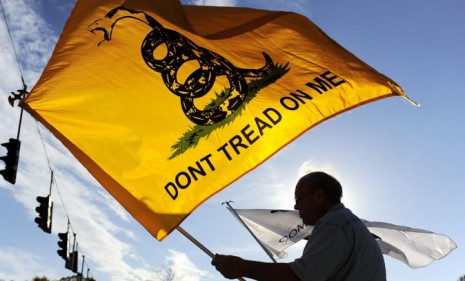The Tea Party: Not as revolutionary as it thinks
Tea Partiers are not actually new in American politics, says Gary Younge in The Guardian. They're just a repackaged version of old-school, hardline conservatism

A free daily email with the biggest news stories of the day – and the best features from TheWeek.com
You are now subscribed
Your newsletter sign-up was successful
Don't waste time trying to figure out what the Tea Party will do next, says Gary Younge in Britain's Guardian. "The 'Tea Party' doesn't exist." Yes, its "political energy" pushed the nation rightward in the midterm elections. But the Tea Party has "no members, leaders, office bearers," or policies. It is just a "shorthand" term for "loosely affiliated, somewhat like-minded people" who favor low taxes and small government — with opposition to gay marriage expected, though not required. In short, says Younge, the Tea Party is just a catchy new name for something quite old in American politics: The "hard right." Here, an excerpt:
Having a name helps. It has offered a political identity to a significant number of people who were either not active or might not have understood themselves to be in any way connected. That name has helped reorient the stated priorities of the right away from social issues and towards fiscal ones. But this is no more than the old whine in new bottles.
Most of the characters now closely associated with the Tea Party are not new to rightwing politics. They have just moved from the margins to the mainstream. Sharron Angle, the failed Senate candidate from Nevada, has held state office since 1998. While in the 42-member state assembly, she voted "no" so often on consensual matters that such votes were sometimes referred to as "41-to-Angle". The much-maligned Delaware Tea Party candidate, Christine O'Donnell, stood unopposed in the Republican primary in 2008 before going on to challenge Joe Biden. These people didn't join the Tea Party, the "Tea Party" term attached itself to them.
The Week
Escape your echo chamber. Get the facts behind the news, plus analysis from multiple perspectives.

Sign up for The Week's Free Newsletters
From our morning news briefing to a weekly Good News Newsletter, get the best of The Week delivered directly to your inbox.
From our morning news briefing to a weekly Good News Newsletter, get the best of The Week delivered directly to your inbox.
Read the full article at the Guardian.
A free daily email with the biggest news stories of the day – and the best features from TheWeek.com
-
 The broken water companies failing England and Wales
The broken water companies failing England and WalesExplainer With rising bills, deteriorating river health and a lack of investment, regulators face an uphill battle to stabilise the industry
-
 A thrilling foodie city in northern Japan
A thrilling foodie city in northern JapanThe Week Recommends The food scene here is ‘unspoilt’ and ‘fun’
-
 Are AI bots conspiring against us?
Are AI bots conspiring against us?Talking Point Moltbook, the AI social network where humans are banned, may be the tip of the iceberg
-
 The billionaires’ wealth tax: a catastrophe for California?
The billionaires’ wealth tax: a catastrophe for California?Talking Point Peter Thiel and Larry Page preparing to change state residency
-
 Bari Weiss’ ‘60 Minutes’ scandal is about more than one report
Bari Weiss’ ‘60 Minutes’ scandal is about more than one reportIN THE SPOTLIGHT By blocking an approved segment on a controversial prison holding US deportees in El Salvador, the editor-in-chief of CBS News has become the main story
-
 Has Zohran Mamdani shown the Democrats how to win again?
Has Zohran Mamdani shown the Democrats how to win again?Today’s Big Question New York City mayoral election touted as victory for left-wing populists but moderate centrist wins elsewhere present more complex path for Democratic Party
-
 Millions turn out for anti-Trump ‘No Kings’ rallies
Millions turn out for anti-Trump ‘No Kings’ ralliesSpeed Read An estimated 7 million people participated, 2 million more than at the first ‘No Kings’ protest in June
-
 Ghislaine Maxwell: angling for a Trump pardon
Ghislaine Maxwell: angling for a Trump pardonTalking Point Convicted sex trafficker's testimony could shed new light on president's links to Jeffrey Epstein
-
 The last words and final moments of 40 presidents
The last words and final moments of 40 presidentsThe Explainer Some are eloquent quotes worthy of the holders of the highest office in the nation, and others... aren't
-
 The JFK files: the truth at last?
The JFK files: the truth at last?In The Spotlight More than 64,000 previously classified documents relating the 1963 assassination of John F. Kennedy have been released by the Trump administration
-
 'Seriously, not literally': how should the world take Donald Trump?
'Seriously, not literally': how should the world take Donald Trump?Today's big question White House rhetoric and reality look likely to become increasingly blurred